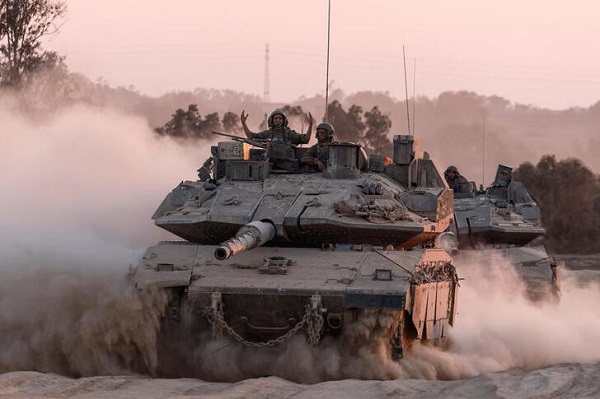 An Israeli soldier gestures on a top of a tank as Israeli military vehicles manoeuvre, near the Israel-Gaza border, amid the Israel-Hamas conflict, 21 August 2024;
Credit: Reuters/Amir Cohen/files
An Israeli soldier gestures on a top of a tank as Israeli military vehicles manoeuvre, near the Israel-Gaza border, amid the Israel-Hamas conflict, 21 August 2024;
Credit: Reuters/Amir Cohen/files
LONDON (Reuters) - The United Kingdom will immediately suspend 30 of its 350 arms export licences with Israel because there was a risk such equipment might be used to commit serious violations of international humanitarian law, foreign minister David Lammy said on Monday 2 September 2024.
Lammy said the decision to suspend the licences did not amount to a blanket ban or an arms embargo, but only involved those that could be used in the ongoing conflict between Israel and Hamas in the Palestinian enclave of Gaza.
"We recognise, of course, Israel's need to defend itself against security threats, but we are deeply worried by the methods that Israel's employed, and by reports of civilian casualties and the destruction of civilian infrastructure particularly," Lammy told parliament.
Soon after the Labour Party won an election in July 2024, Lammy said he would update a review on arms sales to the UK's ally Israel to ensure these complied with international law.
"It is with regret that I inform the House [of Commons, lower house of parliament] today the assessment I have received leaves me unable to conclude anything other than that for certain UK arms exports to Israel, there does exist a clear risk that they might be used to commit or facilitate a serious violation of international humanitarian law," Lammy said.
British exports amount to less than 1% of the total arms Israel receives, and the minister said the suspension would not have a material impact on Israel's security, and the UK continued to support its right to self-defence.
Israeli Foreign Minister Israel Katz said the decision was disappointing and "sends a very problematic message" to Islamist militant group Hamas and its patrons in Iran.
Both Israeli and Palestinian leaders are being investigated for alleged war crimes and crimes against humanity in the wake of the attacks on 7 October 2023 by Hamas in southern Israel, which killed 1,200 people, by Israeli tallies.
The Israeli response in Gaza has killed more than 40,700 people, according to Palestinian health authorities.
Lammy said Monday's decision was not a judgment on whether Israel had breached international law or not.
Israel and Palestinian leaders have dismissed allegations of war crimes.
"This is a forward looking evaluation, not a determination of innocence or guilt, and it does not prejudge any future determinations by the competent courts," he said.
According to information provided by government officials to Reuters and data from the Department for Business and Trade's Export Control unit, the value of permits granted for the sale of military equipment to its ally fell by more than 95% to a thirteen-year low after the start of the war in Gaza.
Many of the licences approved in the period after the start of the conflict were for items listed for "commercial use" or non-lethal items such as body armour, military helmets or all-wheel drive vehicles with ballistic protection.
Despite winning a landslide victory in July, British Prime Minister Keir Starmer's party did suffer significant setbacks in areas with large Muslim populations and he has been under pressure from some of his lawmakers to take a firmer line with Israel over the conflict.
Military components
Among the items included under the arms export suspension will be components for military aircraft including fighter jets, helicopters and drones.
But, parts for F-35 fighters will be exempted, except where going directly to Israel, as the government said it was not possible to suspend these without prejudicing the jets' entire global programme.
"The government’s statement today that it is suspending 30 arms export licences to Israel is a belated, but welcome move, finally acting upon the overwhelming evidence of Israeli war crimes in Gaza," said Sam Perlo-Freeman, Research Coordinator for Campaign Against Arms Trade said. "But exempting parts for Israel’s F-35 is utterly outrageous and unjustifiable."
Unlike the US, the UK's government does not give arms directly to Israel but rather issues licences for companies to sell weapons, with input from lawyers on whether they complied with international law.
Earlier this month, the United States approved the sale of $20 billion in fighter jets and other military equipment to Israel.








